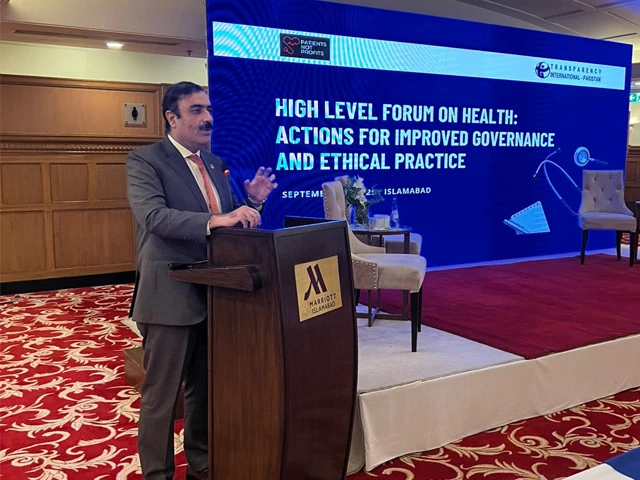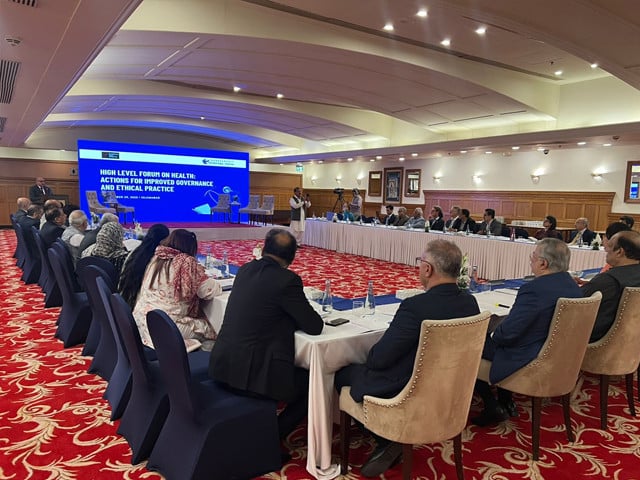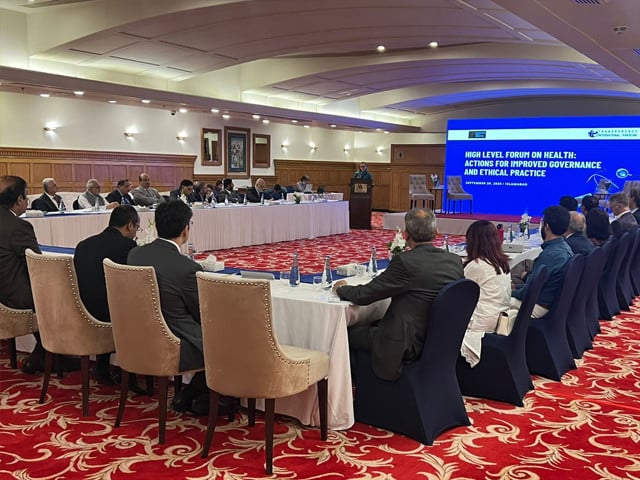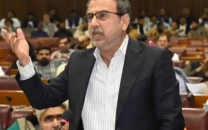Stakeholders push reforms to curb unethical medical practices in Pakistan
Forum tackles rampant quackery, unethical practices and profit-driven care that weaken public trust

Pakistan’s healthcare regulators, medical bodies and pharmaceutical representatives came together on Monday to address rampant unethical practices in the country’s health sector, where weak oversight, quackery and profit-driven care undermine public trust.
The High-Level Forum on Good Governance and Ethical Practices in the Medical and Pharmaceutical Sector was held at a hotel in Islamabad, co-organised by Transparency International Pakistan (TIP) and PatientsNotProfits, an initiative of the London School of Hygiene & Tropical Medicine (LSHTM) and Aga Khan University.
Justice (retd) Zia Perwez, who currently chairs TIP, told the gathering: “Any attempt at reforming healthcare should not be a state-led process alone. It must include the voices of healthcare professionals and other concerned stakeholders.”
DRAP chief executive Dr Obaidullah admitted governance has long been a challenge. “The very idea of establishing entities such as the DRAP and the respective healthcare commissions was that they would work differently from government bureaucratic culture,” he said, adding that regulatory bodies must ensure transparency, accountability and ethical delivery of services.
The centre of the forum’s discussion was unethical medical practice. Research presented by LSHTM and AKU showed that “40% of doctors in Karachi took a bribe from sales representatives affiliated with a completely fictitious company,” said Prof Mishal Khan, highlighting how easily financial incentives can trump patient care.

Based on the research, Prof Khan, along with TI Pakistan’s Kashif Ali, put forward a series of policy recommendations to curb unethical practices. These included introducing a standardised curriculum on health regulations and ethics, making continuing medical education mandatory for doctors’ relicensing, and requiring pharmaceutical staff to undergo training focused on ethical marketing.
They also called for a fair complaints system, mandatory public reporting by drug companies, regular disclosure of regulatory actions, and stronger capacity for DRAP to function effectively. Other proposals included enforcing rules on pharmaceutical marketing spend, reporting action taken against substandard drugs, and strengthening regulation of nutraceuticals.
Prof Dr Sameen Siddiqi, chair of the Department of Community Health Sciences at AKUH, called the study by Prof Mishal Khan’s team a landmark publication. “It’s not easy to conduct a study of this nature in any country,” he said. The paper found that “40% of our physicians are engaged in unethical practices.”
Dr Rizwan Taj, who took over the PMDC’s reins just over two years ago, said medical education had already been aligned with global standards and confirmed CME would be made mandatory for relicensing within a year. “At the moment we have 400,000 doctors registered. We will link relicensing with continuing medical education,” he said.
Dr Aamir Jafarey of SIUT urged the PMDC to treat bioethics as a separate discipline. “There must be a structured approach to developing bioethics as a department,” he said.
On the pharmaceutical side, Pakistan Pharmaceutical Manufacturers’ Association (PPMA) member Dr Osman Waheed said the body would establish an ethics committee and provide training material on ethical marketing. “Unless there is buy-in from everyone or strict enforcement, there wouldn’t be impactful change,” he said.
The second panel, moderated by TI Pakistan’s Kashif Ali, featured Dr Zainab Hasan, Director of Clinical Governance and Training at the Sindh Healthcare Commission; Ayesha Tammy Haq, Executive Director of the Pharma Bureau; Dr Noor Muhammad Shah, director of DRAP’s licensing division; and Dr Shahzad Ali Khan, Vice Chancellor of the Health Services Academy.
Dr Zainab said one of the biggest issues in enforcing regulations is the lack of public awareness. “We receive plenty of complaints, but there have been hardly any on over-prescribing or unnecessary medical tests,” she said. Moreover, “many of the persons who are engaged in over-prescriptions aren’t even doctors, they are quacks,” she added.

“At the SHCC, we are big advocates for ethical practices,” Dr Zainab said. “We even collaborated with Dr Mishal and her team on their research study and there was lots of learning for us.”
Ayesha Tammy Haq of the Pharma Bureau said the issue was not profit-making but excessive profiteering. “Pharma companies are not philanthropists. They are there to make a profit. But you don’t need to make 10,000% profit,” she said.
The DRAP CEO clarified that the regulator had advertised a call for proposals six months ago but had hardly attracted any interest. “We cannot expect Pakistan to develop a new drug in the next 10 years, but at least we can have local research to identify systemic issues and ways to address them,” he stressed.
Health Services Academy Vice Chancellor Dr Shahzad Ali Khan called for joint ownership of reforms. “The government alone cannot provide services to the entire population. You need the private sector to work with the government,” he said.
Participants agreed to form a working group under DRAP to advance reforms, pledging to strengthen accountability, transparency and collaboration in order to restore public trust in healthcare.





















COMMENTS
Comments are moderated and generally will be posted if they are on-topic and not abusive.
For more information, please see our Comments FAQ